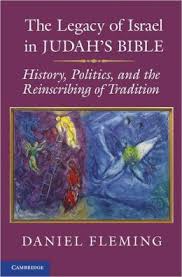 I recently began reading The Legacy of Israel in Judah’s Bible: History, Politics, and the Reinscribing of Tradition
I recently began reading The Legacy of Israel in Judah’s Bible: History, Politics, and the Reinscribing of Tradition by Daniel E. Fleming, professor of Hebrew and Judaic Studies at New York University. I’m glad I did; it’s a great book.
Israel began as a unified people but split into northern and southern kingdoms in 930 BC after the death of King Solomon. The northern kingdom retained the name “Israel” and the smaller southern kingdom was known as Judah, and its capital was Jerusalem.
The northern kingdom was overrun by the Assyrians in 722 BC, much of its population was taken captive, and the nation never revived. Judah, however, remained survived until 587 BC when Jerusalem fell to the Babylonians. Only, unlike Israel, Judah returned in 539 BC to rebuild their temple and their nation.
The nation of Judah survived and the Old Testament is Judah’s story. Even though their northern counterparts certainly had written traditions that the Judahites possessed, these traditions were edited and brought into Judah’s story to reflect the story these postexilic survivors wanted to tell. The Judahites were the ones who determined its final shape and content. The flow of the long narrative from Genesis to 2 Kings culminates in Judah’s story. The prophets and the Psalms focus on Judah and Jerusalem. The Old Testament is “Judah’s Bible.”
But the story that the Judahites tell includes Israel significantly. They present their own beginning as part of the unified nation called Israel under Saul, David, and then Solomon. It also tells the story of the northern kingdom’s rise and fall in some detail, though clearly with little positive to say about it.
The question Fleming address is this: Given that the story of Israel and Judah is told through Judahite eyes, what can we learn, through biblical and archaeological evidence, of the history of the northern kingdom Israel?
The book is about 320 pages long and is divided into 4 parts.
Part 1 Introduction: Israel and Judah. The divided nations had very different types of political organization, with Judah being more centralized and less diverse, and Israel being larger, decentralized, and more politically collaborative.
Part 2 Israelite Content in the Bible. Fleming looks at specific texts that preserve narrative content from Israel and indicate the contrasts between the two nations.
Part 3 Collaborative Politics. Fleming elaborates the collaborative politics of Israel, with the Amorites and Arameans as a backdrop.
Part 4 Israel in History. Fleming concludes with a lengthy discussion of what we can know historically of Israel, tracing Israel’s story from its 14th century antecedents through the divided monarchy.
This book is an academic volume, but not technical. It might be tough going for college students, but certainly not for seminarians or doctoral students.
I have long been keenly interested in that perennial problem of history in the Old Testament–what kind of “history” writing do we find there and how much of it? This is not simply a problem for book like Genesis, but for every part of the Old Testament, including the so-called “historical books” of the monarchy and divided monarchy. So far, I like this book a lot and I recommend it to those who have similar interests.
If anything, The Legacy of Judah’s Bible demonstrates not simply that the Old Testament tells a story from the perspective of one portion of that nation, late in time. That is assumed, for it is neither controversial or contested in scholarly circles. Rather, Fleming demonstrates–perhaps ironically for some–how much history can actually be uncovered once you recognize that the survivors told the story.
************
All comments are welcome–pro, con, or neutral–provided they are respectful and genuinely engage the post or a comment on the thread. Badgering comments will be deleted. Extended lecturing will be tolerated to a point. Also, rest assured I read every comment that is posted. I learn something new from many of them, as I’m sure others do, too. I wish I could respond more, and I will as time allows.
